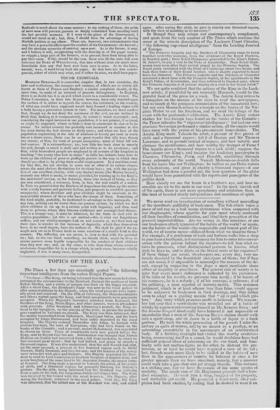YOUNG CRIMINALS,
MORNING HERALD.—/I is somewhat singular that, in two countries, the laws and institutions, the manners and customs, of which are so widely different as those of France and England, a similar complaint should, at the same time, be made of an increase of juvenile delinquency. In England, there is no doubt but it is an evil which exists to a considerable extent. The Police Committee, in their late Report, however, have only touched upon the surface of it, either as regards the source, the existence, or the remedy, of what one would have supposed would have formed a leading object with a body having a preventive system in view. For ourselves, we must confess that, though we do not deny theexistence of the evil, we are inclined to, think that, looking at it comparatively, its extent is much overrated ; and, considering the rapid increase in our population, it is not greater, if so great, as might be expected, where so little is done to counteract its rise or its increase. No settled country has probably ever increased in number as this has done during the last twenty or thirty years; and when we hear of the population augmenting at the rate of nineteen or twenty per cent, in every ten or a dozen years, there can be no great wonder that idle boys throng our streets, or that, for want of proper occupation, many of them fall into bad courses. It is extraordinary, too, how little has been done to remedy the evil, though so much is daily said and written as to its existence ; and that, while benevolent people are employed in all corners of the kingdom in teaching " the young idea how to shoot," so little has hitherto been done to train up the children of poor or profligate parents in the way in which they should go—that is, by giving them useful employment. In a maritime country like this, the sea service, in some one or other of its various shapes, seems the most obvious destination for destitute boys ; yet, with the exception of one excellent charity, with very limited means (the Marine Society), scarcely any effort is made, or means provided, for training up to the King's, the merchants' service, or the fisheries, those who instead of being, as they are now considered, a nuisance, form, in fact, the real wealth of a nation. In Paris we perceive that the Duchess of Angouleme has taken up the matter with a truly humane and patriotic feeling, and proposes to establish spacious receptacles, where destitute and poor children might be received, in the unavoidable absence of those who have the charge of them. Something of the kind might, probably, be instituted to advantage in this metropolis. At any rate, nothing can be worse than our present system, by which we first allow children to sin up to a certain point with impunity, and then send them to prisons, where they become confirmed and accomplished thieves. This is a strange way, it must be 'admitted, for the State to deal with its surplus population ; yet this is our method—this is what our Legislature suffers, and our charity-mongers look on and connive at, and then turn up their eyes in wonder at the increase of depravity, which they themselves have, in no small degree, been the authors of. We shall be glad if the example now set us in France leads to some exertions of a similar kind in this country. The difficulty, we are aware, is, how to deal with the parental tie ; but, on the one hand, something, we should think, might be done to render parents more legally responsible for the conduct of their children than they now are; and, on the other, to take from those whom crime or misfortune disqualifies for it, a charge which' in such cases, becomes wholly neglected, if not, in many cases, disregarded.


















 Previous page
Previous page